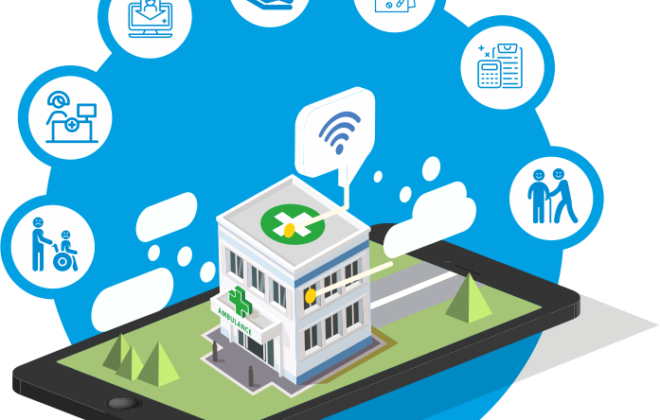Here’s What Healthcare Executives Need To Know While Embarking On The Journey Of Smart Hospitals
Since the last few years, the healthcare sector has seen an exponential rise in the adoption and use of new healthcare technologies. By exploiting an unprecedented amount of data and combining it with modern technology like cloud computing, machine learning, big data analytics, Artificial Intelligence (AI), and the Internet of Things (IoT), the healthcare sector is heading to a different business model altogether. The smart hospital model aims to integrate all operations within the healthcare environment including building design, hospital operations, care delivery, and patient experience through automation, IT innovation, and smart technology.
What are smart hospitals
A smart hospital mainly works on the concept of IoT. Using a network of optimized and automated devices and processes, a smart hospital leverages modern technology to deliver improved patient outcomes and lower healthcare costs, while ensuring personalized care to patients. As the world’s data volume grows 40% a year, and as global healthcare spend is set to rise to $8.7 trillion by 2020, smart hospitals are set to transform the industry. By combining connected devices with cloud computing, analytics, machine learning and AI, a smart hospital quickly gathers and processes data and offers healthcare practitioners the insight they need for improved diagnosis, treatment, and patient experience.
What are the components of a smart hospital
The smart hospital concept is brought to reality through an amalgamation of several different technologies:
Sensors: Sensors in the form wearables find major use across several healthcare departments such as laboratories, operating rooms as well as in the home environment. By accurately monitoring vital stats as well as environmental conditions, these sensors capture critical health information, provide healthcare providers with accurate and timely insights into patient health, determine how patients are responding to treatment and medication, and offer patients insight into their own physiology to improve their wellbeing. Do you know? The install base of healthcare IoT devices is expected to reach 646 million in 2020.
Blockchain: Blockchain technology is enabling the healthcare sector to improve and streamline access to patient data. By bridging traditional data silos, and increasing organizational efficiencies, it securely stores patient data profiles which can then be shared with patients, healthcare providers and even research organizations. It is estimated that by 2025, 55% of healthcare applications will have adopted blockchain for commercial deployment.
Analytics: Big data and other forms of analytics are an integral part of the smart hospital concept. By capturing medical data and sharing it with stakeholders in a secure manner, analytics is helping healthcare organizations in predicting trends, improving diagnosis, curing diseases, and enhancing quality of life. Do you know? Global investment in clinical analysis is expected to reach a value of $11.35 billion by 2025.
AI: AI plays a significant role in smart hospital concept; by providing the advanced ability to analyze a patient’s data, AI delivers personalized treatment plans that combines attributes from patients’ medical history, clinical expertise, healthcare trends and external research data. AI can also be used in identifying patterns in huge data sets of genetic information and medical records and can help healthcare organizations improve treatment through right identification of identify mutations and linkages in diseases. According to reports, the AI healthcare market will hit $6.6 billion by 2021
What are their benefits
A smart hospital is not about what modern technology can do, but what healthcare practitioners no longer have to do.
● By integrating human intelligence with machine learning and analytical tools, hospitals can enhance precision around diagnoses and treatment options.
● By freeing up clinicians’ time, smart hospitals can help practitioners focus on delivering personalized care.
● By enabling patients to control the room temperature, lighting, and smart TVs, hospitals can improve patient satisfaction.
● By providing quick and easy access to patient data through the use of smartphones and tablets, hospital staff can improve productivity and patient care.
● By leveraging monitoring solutions, doctors can check patients’ adherence to treatment plans and compliance to prescriptions.
● By enabling healthcare providers to monitor patients in real time, organizations can optimize costs by reducing unnecessary visits to doctor, minimizing hospital stays and readmissions.
● By providing access to real-time data, doctors can make informed, data-driven decisions and ensure evidence-based treatments.
What does the future look like?
Without a doubt, smart hospitals will have a major impact on global healthcare systems. As healthcare expenditures rise (the total expenditure on health per capita in Malaysia is a whopping $1,040), and as the sector works towards increasing life expectancy and improving overall healthcare diagnosis and treatment, smart hospitals will enable the healthcare sector to achieve targets. By enabling better quality care with personalized approaches and reduced errors, smart hospitals are all set to deliver better patient outcomes. In a world where consumerization is taking over, and affordable healthcare is slowly depleting, smart hospitals that employ a patient-centric approach ensure healthcare costs, as well as patient experience, is optimal. If improving healthcare outcomes and reducing healthcare costs is your motto, the smart hospital is the only way forward. Is your healthcare organization ready for this smart journey?




